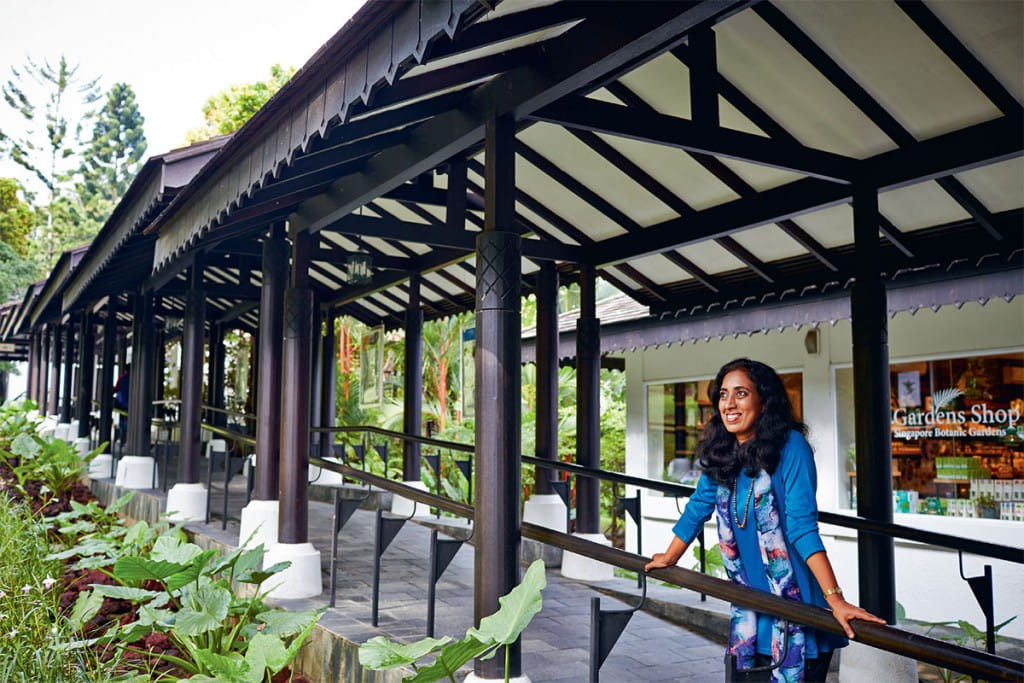Stories > Thinking Green Every Step of the Way
Thinking Green Every Step of the Way

Bhavani Prakash at the Singapore Botanic Gardens. She has also started a little community garden in her condominium with a neighbour. So far, they have planted about 20 fruit trees, including rambutan, papaya and guava.
Eco-activist Bhavani Prakash shares how Singapore sparked her love for nature and inspired her to leave the corporate world and take up the environmental cause.
BY JACQUELINE TAN
PHOTOS JUSTIN LOH
or Bhavani Prakash, her time spent as a guide at the Singapore Botanic Gardens 13 years ago triggered an enduring commitment to care for the environment and expand her community and outreach work in the country she now calls home.
“I came to understand the beauty and fragility of the ecosystem in the course of my research on the environment,” she says.
Her new-found passion led her to give up a career in finance to further the environmental cause in Singapore and Asia. She is now a speaker, writer and mindfulness trainer who coaches corporations on leadership, awareness, corporate social responsibility (CSR) and sustainability.
“Singapore is where we’ve lived the longest,” says Prakash, who is originally from Chennai, India, and is now a Singapore permanent resident. She relocated to Singapore in 2003 with her family when her husband was posted here, having lived in Toronto, London and Dubai. She has a master’s degree in financial economics and previously worked in the finance department of an oilfield services company in Dubai.
“My daughters, now 20 and 15, practically grew up here. I appreciate all that Singapore has to offer. It is the place where I truly blossomed, where I had my first environmental awakening and this sense of urgency to do something about it,” she adds.
She had an epiphany in 2008 during a seminar in Singapore, in which she was asked to think about what she would most regret not doing in this lifetime. She thought back to her time as a volunteer guide at the Singapore Botanic Gardens and how she would urge visitors to take personal action towards protecting the environment.
“I used to view the environment as an issue on its own, but gradually learnt to see how it is inextricably linked with human issues. I believe in showing compassion towards all living things not just in thought, word and action, but also in what we choose to eat, drink and wear – these actions may directly or indirectly cause harm, especially to the poorest and most vulnerable in society.”
Green lobbyist Bhavani Prakash
ECO-WARRIOR
She decided to commit to the environmental cause full-time, and started Eco Walk The Talk, a non-profit website that features eco news and insights, in 2008. This was followed in 2011 by Green Collar Asia, a portal that engages corporations and their employees on issues of sustainability and leadership. Through this, she has reached out to more than 20 companies and their employees, making environmental awareness a key part of their CSR policies.
In 2013, she also started a community Facebook group, Grow Your Own Food In Singapore, to encourage people to take up urban farming. “It’s about seeding awareness, creating possibilities and opening people’s minds to it,” she says.
Over time, she has developed a deeper understanding of the impact of human activities on the environment, encompassing related issues such as fair trade and social and economic justice. She has spoken at TEDx events that help share ideas in communities around the world. TEDx is a spin-off from TED, a global non-profit organisation devoted to spreading ideas. She has met people who told her that they have changed their mindset and lifestyle to be more environmentally conscious after listening to her talks or reading her articles.
For her work, she was named Woman of the Year 2014 at the inaugural Sony-IWA (Indian Women’s Association) awards ceremony, which takes place biennially.
While public engagement forms a big part of her work, she also stresses the need to lobby and work with the regulatory authorities. Last year, with funding from the National Environment Agency – the government organisation responsible for improving and sustaining Singapore’s clean and green environment – she published The Sustainability Toolkit. Featuring best practices from 11 Singapore-based companies, the toolkit provides ideas for organisations to make their operations more environmentally and socially responsible.
At the community level, Prakash feels more can be done to change people’s attitudes towards waste management. She has observed that in countries like Australia, where rubbish collection is less frequent, people tend to be more conscious of wastage and more proactive in sorting garbage from recyclable or reusable items. She says: “We should shift our focus to conserving resources and consider a circular economy where products are made to last longer and parts can be dismantled, recycled and reused.”
At home, her family walks the talk. Her husband, an IT professional, is an avid gardener. They use homemade compost for growing fruit and greens in the rooftop garden of their apartment.
“What I’m championing is what should be mainstream and an everyday practice in the first place,” she says.
